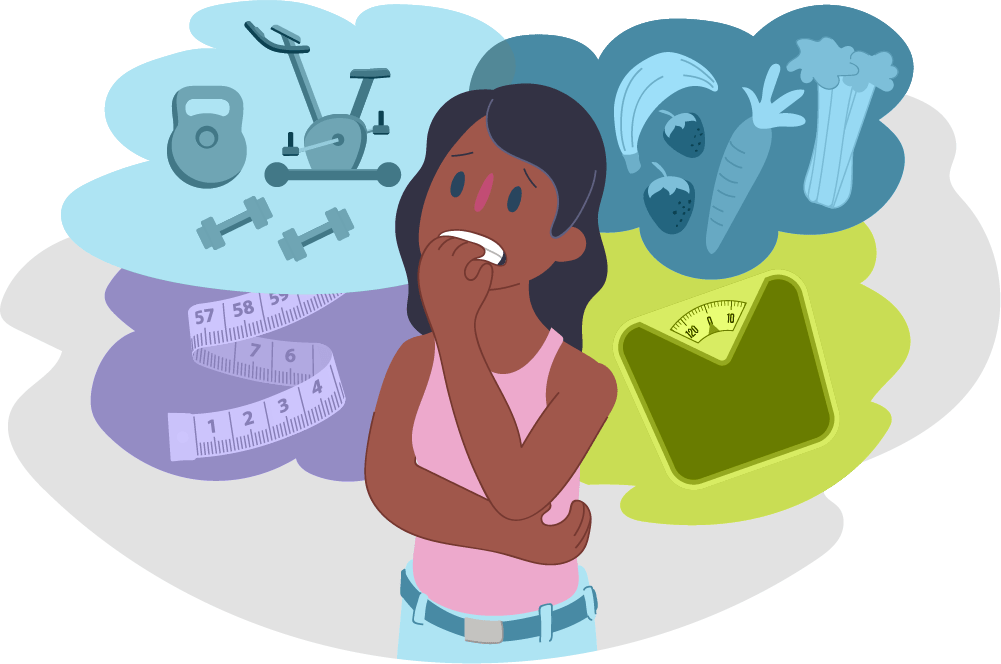Do you ever find yourself eating more than you intended to? Feeling guilty after eating? Or eating when you’re not even hungry? If so, you may be struggling with an overeating disorder. This is a serious condition that can have negative consequences on your health and wellbeing. In this blog post, we will discuss the signs and symptoms of overeating disorder, as well as treatment options.
Contents
- 1 What Is Overeating Disorder?
- 2 Types of Overeating Disorder
- 3 Signs of Overeating Disorder
- 4 Causes of Overeating Disorder
- 5 Negative Impacts of Overeating Disorder
- 6 Diagnosis of Overeating Disorder
- 7 Treatment of Over-eating Disorder
- 8 Self-Help Strategies For Over-eating Disorder
- 9 How To Help Someone With Overeating Disorder?
- 10 Conclusion
What Is Overeating Disorder?
 Overeating disorder is a condition characterized by compulsive overeating but without the purging behaviors seen in bulimia nervosa. People with this disorder frequently eat large amounts of food in a short period of time and feel unable to control their eating. They may eat even when they’re not hungry and continue eating until they’re uncomfortably full.
Overeating disorder is a condition characterized by compulsive overeating but without the purging behaviors seen in bulimia nervosa. People with this disorder frequently eat large amounts of food in a short period of time and feel unable to control their eating. They may eat even when they’re not hungry and continue eating until they’re uncomfortably full.
Overeating disorder is sometimes referred to as binge eating disorder, compulsive overeating, or emotional eating. It’s considered a type of disordered eating, which is an umbrella term used to describe abnormal patterns of eating that may or may not be associated with an underlying psychological disorder.
People with overeating disorders are at risk of developing obesity and other health problems. If you think you may have this disorder, talk to your doctor or mental health professional. They can help you develop a plan to address your symptoms and improve your overall health. There may be some underlying emotional issues that need to be addressed such as depression, anxiety, or trauma.
Overeating disorder is a serious condition that can have a negative impact on your physical and mental health. If you think you may have this disorder, talk to your doctor or mental health professional. They can help you develop a plan to address your symptoms and improve your overall health.
Types of Overeating Disorder

There are many types of overeating disorders, each with its own unique set of symptoms. The most common type is bulimia nervosa, which is characterized by binge eating followed by purging behaviors such as self-induced vomiting or misuse of laxatives. Other types include compulsive overeating (also known as binge eating disorder) and night eating syndrome.
Compulsive Overeating
Compulsive overeating, also known as binge eating disorder, is a type of overeating disorder that is characterized by recurrent episodes of binge eating. Binge eating episodes are typically marked by consuming large amounts of food in a short period of time, often to the point of feeling uncomfortably full. After a binge eating episode, people with compulsive overeating may feel ashamed, guilty, or disgusted with themselves. This type of overeating can lead to serious health complications, such as obesity, type II diabetes, and heart disease.
Night Eating Syndrome
Night eating syndrome is a type of overeating disorder that is characterized by recurrent episodes of night eating. The night eaters typically consume 50% or more of their daily caloric intake after the evening meal. They may also have difficulty falling asleep or staying asleep due to their nighttime eating habits. Night eating syndrome can lead to weight gain and other health problems, such as type II diabetes and sleep disorders. This type of overeating disorder is often treated with a combination of psychotherapy and medication.
Anorexia Nervosa
Anorexia nervosa is a type of overeating disorder that is characterized by restrictive eating and an intense fear of gaining weight. People with anorexia nervosa may severely restrict their caloric intake, leading to extreme weight loss. They may also have a distorted body image and engage in compulsive exercise. Anorexia nervosa is a serious condition that can lead to health complications such as heart problems, bone loss, and electrolyte imbalances.
Rumination Disorder
This type of disorder is a type of overeating disorder that is characterized by recurrent episodes of rumination. Rumination is the act of regurgitating food that has been previously swallowed. People with rumination disorder may vomit up their food, chew on it again, and then re-swallow it. This condition can lead to weight loss, dehydration, and malnutrition. Rumination disorder is often treated with a combination of psychotherapy and medication.
Pica
Pica is a type of overeating disorder that is characterized by the compulsive consumption of non-food items. People with pica may eat items such as dirt, paint chips, hair, or paper. Pica can lead to health problems such as gastrointestinal obstruction or infection. Pica is often treated with a combination of behavior therapy and medication. There may be an underlying medical condition such as an iron deficiency that is causing the pica.
Avoidant/Restrictive Food Intake Disorder
Avoidant/restrictive food intake disorder (ARFID) is a type of overeating disorder that is characterized by a fear of eating or a lack of interest in food. People with ARFID may avoid certain foods or types of food due to a fear of choking, vomiting, or gaining weight. ARFID can lead to weight loss, malnutrition, and other health problems. This type of overeating disorder is often treated with a combination of psychotherapy and medication. It also helps to provide the person with ARFID with information about nutrition and healthy eating.
Signs of Overeating Disorder

There are many signs of overeating disorder, both physical and psychological. The most common physical sign is weight gain, but other physical signs can include:
Feeling Out of Control Around Food
One of the most common signs of overeating disorder is feeling out of control around food. This means that you feel like you can’t stop eating, even when you’re not hungry. You may eat until you’re uncomfortably full, and then keep eating. This can lead to weight gain and other health problems.
Change in Eating Habits
A change in eating habits is another sign of overeating disorder. You may start to binge eat, or eat more often than you used to. You may also start to avoid certain foods or types of food. This can lead to weight loss or weight gain. There maybe a change in your eating habits, such as skipping meals or eating smaller portions.
Eating Alone
Another sign of overeating disorder is eating alone. This may be because you’re embarrassed about how much you’re eating, or you don’t want anyone to see you eat. Eating alone can also lead to weight gain and other health problems. Also, you may become withdrawn and isolate yourself from friends and family.
Anxiety Around Food
One of the most common psychological signs of overeating disorder is anxiety around food. This means that you may feel anxious about eating, or about not being able to control your eating. This can lead to avoidance of certain foods or types of food. Anxiety also can lead to other mental health problems such as depression.
Depression
Depression is another common psychological sign of overeating disorder. It can make you lose interest in activities that you used to enjoy, including eating. You may also have negative thoughts about yourself, such as thinking that you’re not good enough or that you don’t deserve to be happy. Depression can also lead to weight gain or weight loss.
Obsessive Thoughts About Food
Another psychological sign of overeating disorder is having obsessive thoughts about food. This means that you may think about food all the time, or feel like you need to eat even when you’re not hungry. This can lead to binge eating and other health problems. It may have negative consequences on your work or school performance, as well as your personal relationships.
Hiding Food
Hiding food also is a sign of overeating disorder. You may hide food so that you can eat it later, or so that no one will see how much you’re eating. This can lead to weight gain and other health problems. There may be a change in your eating habits, such as skipping meals or eating smaller portions.
Mood Fluctuations
Mood fluctuations are one of the most common psychological signs of overeating disorder. You may feel happy, excited, or elated when you’re eating, but then feel guilty, ashamed, or sad afterward. This can lead to a cycle of binge eating and purging. Mood fluctuations can also lead to other mental health problems such as anxiety and depression.
Irritability
Irritability is one sign of overeating disorder. You may find that you’re more easily annoyed or angered than usual. This can lead to arguments with friends and family, as well as problems at work or school. Irritability also can be a sign of other mental health problems such as anxiety and depression. It may have negative consequences on your personal relationships.
Stomach Pain Issues
Complaining of stomach pain also is a sign of overeating disorder. You may feel like you have to eat even when you’re not hungry. This can lead to weight gain and other health problems. It may also cause you to miss work or school, as well as social activities.
Dramatic Weight Change
A dramatic weight change is another sign of overeating disorder. You may lose a lot of weight, or gain a lot of weight. This can lead to health problems such as heart disease, diabetes, and high blood pressure. A dramatic weight change also can lead to negative body image. It also may have negative consequences on your work or school performance, as well as your personal relationships.
Causes of Overeating Disorder

There are many causes of overeating disorder. Some of these are:
Depression
Depression is one of the underlying causes of overeating disorder. When you’re depressed, you may lose interest in activities that you used to enjoy, including eating. You may also have negative thoughts about yourself, such as thinking that you’re not good enough or that you don’t deserve to be happy. It can also lead to weight gain or weight loss.
Anxiety
Anxiety is another underlying cause of overeating disorder. When you’re anxious, you may feel like you need to eat even when you’re not hungry. This can lead to binge eating and other health problems. There may be a change in your eating habits, such as skipping meals or eating smaller portions.
Stress
Stress is another underlying cause of overeating disorder. When you’re stressed, you may turn to food for comfort. This can lead to weight gain and other health problems. It may also cause you to miss work or school, as well as social activities. It can make it difficult to stick to a healthy diet.
Genetics
Genetics also can be a cause of overeating disorder. If you have family members with eating disorders, you’re more likely to develop one yourself. This is because eating disorders tend to run in families. It also makes it a lot harder to recover from an eating disorder.
Life Transitions
Life transitions are another cause of overeating disorder. These transitions can be positive or negative. Some examples of life transitions are: starting a new job, getting married, having a baby, going through a divorce, and moving to a new house. These transitions can be stressful and lead to comfort eating.
Excessive Dieting
Excessive dieting is another cause of overeating disorder. When you’re dieting, you may become obsessed with food and your weight. This can lead to binge eating and other health problems. There may be a change in your eating habits, such as skipping meals or eating smaller portions.
Age
Age is one of the risk factors for developing overeating disorder. The younger you are, the greater your risk. This is because eating disorders tend to develop during adolescence or young adulthood. There can be a lot of pressure to be thin during these years.
Gender
Gender is another risk factor for developing overeating disorder. Women are more likely to develop an eating disorder than men. This is because there’s a lot of pressure on women to be thin. There also may be a difference in the way that men and women process emotions.
Negative Impacts of Overeating Disorder

There are many negative impacts of overeating disorder on one’s health. Some of these negative effects are:
Weight gain or weight loss
Weight gain is one of the most common effects of overeating disorder. This can lead to obesity and other health problems such as heart disease, diabetes, and high blood pressure. Weight loss is also a common effect of overeating disorder. This can lead to malnutrition and other health problems.
Digestive problems
Overeating disorder can also cause digestive problems such as constipation, diarrhea, bloating, and gas. These symptoms can be uncomfortable and embarrassing. They also can lead to missed work or school, as well as social activities. Another digestive problem that can be caused by overeating disorder is GERD. This is a condition where the stomach contents leak back into the esophagus.
Fatigue
Fatigue is another negative impact of overeating disorder. When you’re tired, you may have trouble concentrating on work or school tasks. You may also miss out on social activities because you’re too tired. Fatigue can also lead to depression.
Anxiety
Anxiety is another negative impact of overeating disorder. When you’re anxious, you may feel like you need to eat even when you’re not hungry. This can lead to binge eating and other health problems. There may be a change in your eating habits, such as skipping meals or eating smaller portions.
Negative Body Image
Negative body image is another negative impact of overeating disorder. When you have a negative body image, you may feel like you’re not good enough. This can lead to low self-esteem and depression. It also can make it difficult to stick to a healthy diet. There are also physical impacts of having a negative body image. These include:
- Headaches
- Muscle pain
- Stomach pain
- Insomnia
Suicidal Thoughts
Suicidal thoughts are another negative impact of overeating disorder. When you’re feeling suicidal, you may feel like there’s no hope. This can lead to self-harm and even death. There may be a change in your eating habits, such as skipping meals or eating smaller portions.
Self-harm is another negative impact of overeating disorder. When you’re self-harming, you may feel like you’re not good enough. This can lead to low self-esteem and depression. It also can make it difficult to stick to a healthy diet. There are also physical impacts of self-harm. It can lead to scars and infections. It also can lead to more serious health problems, such as organ damage.
Diabetes
Diabetes is one of the most common health problems that can be caused by overeating disorders. This is because when you have diabetes, your body can’t process sugar properly. This can lead to weight gain, as well as other health problems such as heart disease and high blood pressure. If you have diabetes, it’s important to get help from a doctor or therapist. With treatment, you can recover from your eating disorder and live a healthy life.
High Blood Pressure
High blood pressure is another common health problem that can be caused by overeating disorder. This is because when you have high blood pressure, your heart has to work harder to pump blood. This can lead to heart disease, as well as other health problems such as stroke and kidney failure.
Cancer
Cancer is another common health problem that can be caused by overeating disorders. When you have cancer, it means that there are abnormal cells in your body. These abnormal cells can grow out of control and damage healthy tissue. Cancer can also spread to other parts of the body and cause more damage.
Diagnosis of Overeating Disorder
The diagnosis of overeating disorder is not currently recognized in the DSM-V, however, researchers and clinicians are working to have the diagnosis included in future revisions. In order to be diagnosed with overeating disorder, an individual would need to exhibit certain behaviors and symptoms for a period of time. These include:
-Engaging in binge-eating episodes at least once a week for a period of three months
– feeling out of control or unable to stop during these episodes
– feeling distressed or embarrassed after overeating
– continuing to eat even when full or not hungry
– avoiding social situations due to fear of being seen eating
– using food as a way to cope with stress or negative emotions.
The diagnosis also requires that these behaviors and symptoms cause significant distress or impairment in functioning. If you think you or someone you know may have an overeating disorder, it is important to seek professional help. Treatment can be very effective in helping individuals manage their symptoms and live healthy, fulfilling life.
Treatment of Over-eating Disorder

Also, treatment of over-eating disorder usually includes a combination of psychological counseling and medical therapy. The main goals of treatment are to normalize eating patterns and help the person develop a healthier relationship with food.
Medications
Medications are one treatment option for people with over-eating disorder. These Medications can be used to help reduce feelings of hunger or increase feelings of fullness. There are many types of medications that are used to treat over-eating disorders and the best type for each person depends on many factors.
Psychotherapy
Psychotherapy is another treatment option for people with over-eating disorder. Also, psychotherapy can help individuals learn about their relationship with food and develop healthy coping skills. There are many different types of psychotherapy, but one type that has been found to be particularly effective for treating over-eating disorders is cognitive-behavioral therapy (CBT). CBT helps individuals identify thoughts and beliefs that contribute to their disordered eating and teaches them how to replace these thoughts with more positive, realistic ones.
Support Groups
Support groups can be a helpful addition to treatment for people with over-eating disorders. These support groups provide a space for people to share their experiences and connect with others who understand what they are going through. Many support groups also offer education about over-eating disorders and treatment options. If you are interested in finding a support group, we can help. We have a list of support groups that meet in various locations across the country.
Self-Help Strategies For Over-eating Disorder
There are many things you can do on your own to help manage your over-eating disorder.
Educate Yourself
Educating yourself about an over-eating disorder is an important step in managing your symptoms. Learning about over-eating disorders can help you understand your thoughts and behaviors and develop a plan for dealing with them. There maybe be times when you feel like you can’t control your eating, but it is important to remember that you are not alone and there are things you can do to help yourself.
Build a Support System
Having a supportive network of family and friends is crucial for managing an over-eating disorder. These people can provide emotional support and practical assistance when needed. They can also serve as a sounding board for ideas and help hold you accountable for your goals.
Find Healthy Coping Skills
Identifying healthy coping skills is an important part of managing an over-eating disorder. When faced with difficult emotions or situations, it is important to have coping skills that do not involve food. Some healthy coping skills include exercise, journaling, spending time with friends or family, and meditation.
Avoid Triggers
Identifying your triggers is an important step in managing an over-eating disorder. Triggers are anything that causes you to want to eat even when you’re not hungry. Common triggers include boredom, stress, anxiety, depression, and fatigue. Once you know what your triggers are, you can develop a plan for how to deal with them without turning to food.
Set Realistic Goals
When setting goals for yourself, it is important to make sure they are realistic. Trying to accomplish too much at once can be overwhelming and lead to setbacks. Start by setting small, achievable goals and gradually build up from there. Remember that progress is often slow but it is important to be patient with yourself.
Try Professional Help
If you are struggling to manage your over-eating disorder on your own, it may be time to seek professional help. A therapist can provide support and guidance as you work to overcome your disorder. If you are interested in finding a therapist, we can help. We have a list of therapists that specialize in treating over-eating disorders and can help you find the one that is right for you.
MantraCare is here to help you every step of the way. If you or someone you know is struggling with an over-eating disorder, please reach out to us today. We are here to help.
Monitor Your Eating
Keeping track of what, when, and how much you eat can help you become more aware of your eating patterns and make changes if needed. You may want to keep a food diary or use a tracking app on your phone or computer. There maybe be times when you feel like you can’t control your eating, but it is important to remember that you are not alone and there are things you can do to help yourself.
MantraCare is here to help you every step of the way. If you or someone you know is struggling with an over-eating disorder, please reach out to us today. We are here to help.
Talk About It
Talking about your over-eating disorder can be difficult, but it is often a helpful step in managing your symptoms. When talk about your experiences can help you connect with others who understand what you are going through and provide support and encouragement. Talking also helps you to better understand your thoughts and behaviors and develop a plan for dealing with them.
Choose Healthy Foods
Eating healthy foods can help you feel better physically and mentally. Make sure to include plenty of fruits, vegetables, whole grains, lean protein, and healthy fats in your diet. There maybe be times when you feel like you can’t control your eating, but it is important to remember that you are not alone and there are things you can do to help yourself.
Get Active
Exercise can help improve your mood, reduce stress, and boost your energy levels. It is important to find an activity that you enjoy and make it a part of your routine. Exercise can be anything from going for a walk or run to playing a sport or taking a dance class. You may want to try different activities to find one that is right for you.
Set Boundaries
Setting boundaries with family and friends can be difficult, but it is important to do what is best for you. If you have difficulty saying no, set some ground rules for yourself. For example, you may want to limit the amount of time you spend with people who trigger your overeating or avoid places where you are likely to overeat. You may also want to tell people close to you about your disorder and ask for their understanding and support.
Take Time for Yourself
It is important to make time for activities that make you happy and help you relax. This may include reading, spending time outdoors, listening to music, or anything else that brings you joy. Taking time for yourself can help reduce stress and make it easier to manage your over-eating disorder.
How To Help Someone With Overeating Disorder?

Helping someone with an over-eating disorder can be difficult. This is because people with this disorder often do not want to change their eating habits. However, there are some things that you can do to help them.
Talk To That Person
One thing that you can do is to talk to the person about their disorder. It is important to be understanding and non-judgmental when you talk to them. You should also let them know that you are there for them if they need any help. You should also ask them if they want to talk about their disorder.
Encourage Them To See A Doctor
Another thing that you can do is to encourage the person to see a doctor. This is because a doctor can help the person with their disorder. The doctor may also be able to prescribe medication for the person. It can be difficult to encourage someone to see a doctor, but it is important to try.
Help Them To Change Their Diet
You can also help the person to change their diet. This means that you will need to help them to choose healthy foods. You should also encourage the person to eat smaller meals. You can also help the person to avoid trigger foods. Trigger foods are usually high in sugar or fat.
Encourage Them To Exercise
It is also important to encourage the person to exercise. Exercise can help the person to lose weight and it can also help them to feel better about themselves. You should try to find an exercise that the person enjoys doing. You should also encourage them to exercise with other people.
Make Sure They Are Eating Healthy Foods
It is also important to make sure that the person with the overeating disorder is eating healthy foods. This means that they should be eating plenty of fruits and vegetables. They should also be avoiding junk food and sugary drinks. There are also some specific foods that can help to reduce overeating. These include oatmeal, grapefruit, and green tea.
Give Them Support
It is also important to give the person with an overeating disorder support. This means that you should be there for them when they are struggling. You can also offer to help them with their meals or exercises. You should also encourage them to talk to you about their feelings.
These are just some of the things that you can do to help someone with an over-eating disorder. It is important to remember that each person is different and so you may need to tailor your approach depending on the person.
Conclusion
Overeating disorder is a serious problem that can be difficult to overcome. However, there are some things that you can do to help someone with this disorder. You should talk to the person about their disorder. Also, one should also encourage them to see a doctor and change their diet. You should also make sure that they are eating healthy foods and exercising regularly. If you do these things, you will be helping the person with their overeating disorder.
“If you or someone you know may have an eating disorder, please contact us we have amazing resources to help”
If you are looking for affordable Online Counseling MantraCare can help: Book a trial therapy session


